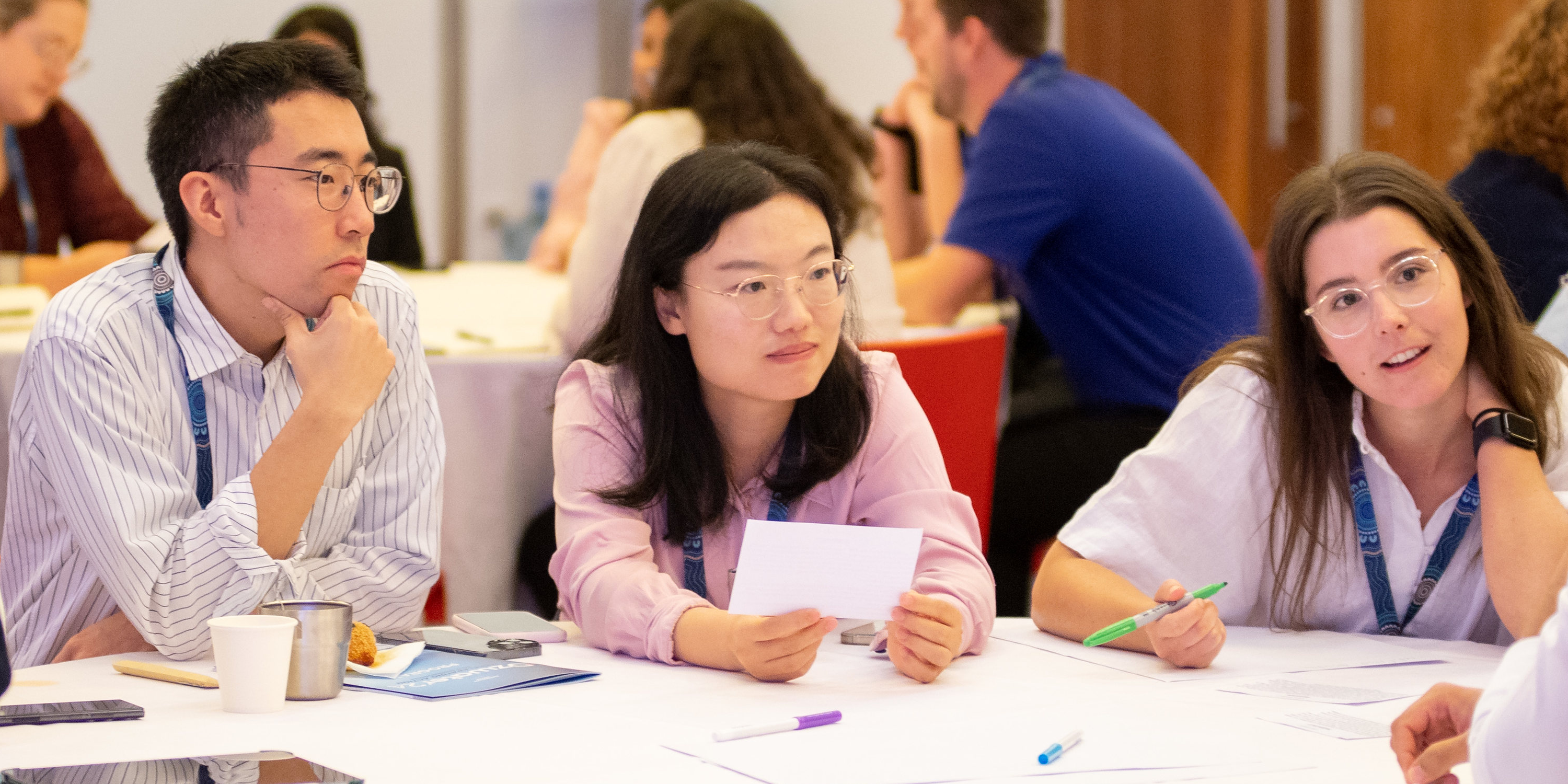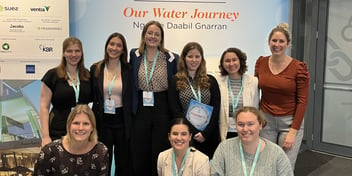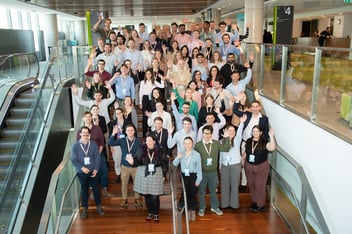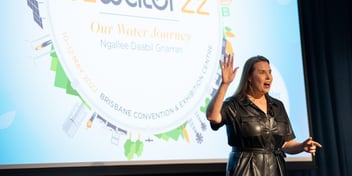Why supporting diverse young leaders is key to the sector’s future

As the water sector continues to work through pressing challenges, YWPs require support to develop leadership skills so that, when the time comes, they can step into permanent leadership positions with confidence and insight.
Held on the Monday before Ozwater’25 officially begins, the Young Water Professionals Program (sponsored by AECOM) is designed to connect and inspire the sector’s future leaders. Including keynote speakers, interactive workshops and panel discussions, the YWP Program offers an opportunity to meet and connect with like-minded YWPs from around Australia.
Set to present at Ozwater’25 on their experience of stepping into leadership positions as young women of colour, WSP’s Annecy Oliveros and Valentina Zheng both believe in the importance of supporting diverse youth into top jobs.
"I'm currently the team coordinator for the Water Utilities team in Brisbane, supporting a talented team of over 20 people alongside of my Team Manager, Chris. Since taking on this role last year, I’ve really gained valuable experience in non-project related tasks,” Oliveros said, reflecting on her journey as a young leader in the water sector.
“Given that the position outlined a need for someone with 5-10 years of experience, I initially talked myself out of applying, thinking I was too young and that another opportunity would come. However, when a colleague followed up asking about whether I was still interested, I took that as a sign from the universe and submitted my application.
“At the time, I had only three and a half years under my belt. I wasn’t sure if I would be considered. Thankfully, WSP has a strong commitment to hiring within and empowering its people for limitless opportunities and growth; this meant that my application was given serious consideration at every step.
Zheng’s journey into water leadership is a bit different, but highly valuable none-the-less.
“I’m a civil technologist and have been with WSP for three and a half years. This is my first and only full-time job since graduating,” she said.
“I stepped into a leadership role because the person who previously held it wanted more time to focus on their chartership. My line manager reached out and asked if I would be interested in applying.
“I was really grateful for the opportunity and vote of confidence. By stepping into the role, I got training and experience, while the existing leader had time to focus on their next step. Since it was an interim role, it felt less intimidating than taking on a permanent leadership position."
Navigating challenges
Despite how important it is for YWPs to have the opportunity to build leadership skills early in their careers, both Oliveros and Zheng said there were significant challenges involved in taking up leadership opportunities that deserve considered support.
Oliveros said one of the first challenges she faced was self-doubt and imposter syndrome.
“After I got the position, I realised there were likely others who applied with far more experience than me. That pressure made me feel like I had to prove myself, to show that I was more than capable to fulfill the role” she said.
“I’ve realised that self-doubt is common, whether you’re young or the most experienced in the room. The key is to reflect on it, celebrate your successes, learn from your mistakes and just embrace it. Use it as a motivator to step out of your comfort zone and strive to do better in everything you do.”
“Over time, I feel like my achievements at work allowed me to accept and appreciate my leadership skills, in leading people and achieving results in both my engineering and team coordinator role.”
Similarly, Zheng was faced with leadership challenges relating to establishing authority as a young leader within a broader team.
“My biggest challenge was authority. I was one of the least experienced team members and the youngest. Leading a group where people had more experience than me was difficult,” she said.
“At first, I tried to establish authority in a formal way – following leadership advice from books and being firm in my approach. But my team responded with silence.
“I realised I needed to lean into my strengths as a team player. I started being more open about my inexperience and took a more collaborative approach. That shift helped me build better relationships.
“Even so, there were tough moments. Some colleagues didn’t take well to me following up on deadlines, responding as if I wasn’t in a position to ask questions. I had to figure out how to do my job effectively without coming across as overly authoritative."
Supporting young leaders
Oliveros said one of the most important things an organisation can do is create opportunities for young people to step into leadership positions to learn key skills.
“In my case, I will be the team coordinator for 2 years, which gives me time to develop my skills in leadership and management, while allowing someone else to step up after me,” she said.
“Some young people don’t want to be in leadership roles, and that’s perfectly fine. But for those who do, organisations need to make space for them.
"Valentina and I have both been fortunate to have supportive senior leaders and colleagues, but I know that’s not the case in every company. In environments where support isn’t there, young leaders need to advocate for themselves, even though that’s not always easy."
Zheng said supporting young professionals in leadership positions requires creating opportunities but also ensuring ongoing support as they learn and grow.
“First, providing the opportunity in the first place, either by opening roles to less experienced candidates, rolling terms or co-share leadership roles, is of course important,” she said.
“But it's also integral to ensure support for young leaders once they’re in the role. One way is fostering a culture where having a young leader is normalised. Senior leaders should actively show support and recognition.
“Another practical step is providing structured guidance. My manager, for example, created a ‘cheat sheet’ of questions for difficult conversations. This form of mentorship from my line manager Renee really helped ease the pressure, made me feel more confident, and reinforced my role within the team. It also gave me a benchmark for how to lead other people effectively by having a forward-thinking approach towards active listening and providing guidance.”
Building the future
Oliveros said supporting young people in leadership positions is one of the ways the water sector can prepare for future challenges today.
"I read a quote by Franklin Roosevelt that stuck with me: ‘We cannot always build the future for our youth, but we can build our youth for the future’,” she said.
“Giving young professionals leadership experience early on equips them for future roles. When others see young leaders thriving, it inspires others to step up as well.
"Younger professionals can also bring fresh perspectives. We naturally bring an enthusiasm to learn and ask questions, which can challenge older ways of doing things and drive innovation."
And Zheng agrees, adding that young people bring fresh energy to challenges.
“Young leaders push for change, especially with technology. The IT industry is full of young energy, while the water sector still has a more traditional leadership structure,” she said.
“If we want to attract and retain young professionals, we need to make leadership opportunities more accessible."
Are you interested in sharing your experience with other YWPs and leaning into key skills for ongoing success? Register for the Ozwater’25 Young Water Professionals Program today.



